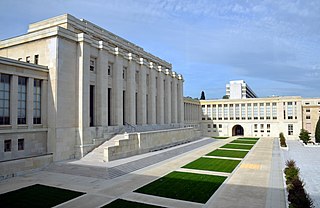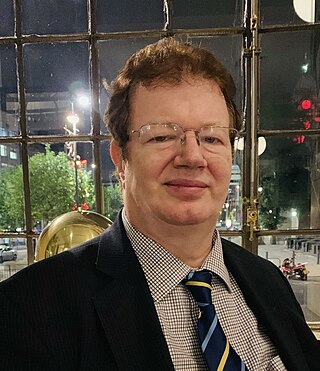Related Research Articles

International relations (IR), sometimes referred to as international studies and international affairs, is the scientific study of interactions between sovereign states. In a broader sense, it concerns all activities between states—such as war, diplomacy, trade, and foreign policy—as well as relations with and among other international actors, such as intergovernmental organisations (IGOs), international nongovernmental organisations (INGOs), international legal bodies, and multinational corporations (MNCs). There are several schools of thought within IR, of which the most prominent are realism, liberalism, and constructivism.

Foreign Affairs is an American magazine of international relations and U.S. foreign policy published by the Council on Foreign Relations, a nonprofit, nonpartisan, membership organization and think tank specializing in U.S. foreign policy and international affairs. Founded on 15 September 1922, the print magazine is currently published every two months, while the website publishes articles daily and anthologies every other month.

A state's foreign policy or external policy is its objectives and activities in relation to its interactions with other states, unions, and other political entities, whether bilaterally or through multilateral platforms. The Encyclopedia Britannica notes that a government's foreign policy may be influenced by "domestic considerations, the policies or behaviour of other states, or plans to advance specific geopolitical designs."
International political economy (IPE) or Global political economy (GPE) is the study of interactions between the economy on a global level and political and economic actors, systems and institutions. More precisely, IPE/GPE focuses on global economic governance, through studies of macroeconomic phenomena such as globalization, international trade, the monetary and financial system, international inequality, and development, and how these are shaped by, amongst others, international organizations, multinational corporations, and sovereign states.
Globalism refers to various patterns of meaning beyond the merely international. It is used by political scientists, such as Joseph Nye, to describe "attempts to understand all the interconnections of the modern world—and to highlight patterns that underlie them." While primarily associated with world-systems, it can be used to describe other global trends. The concept of globalism is also classically used to distinguish the ideologies of globalization from the processes of globalization. In this sense, globalism is to globalization what nationalism is to nationality.

Robert Owen Keohane is an American academic working within the fields of international relations and international political economy. Following the publication of his influential book After Hegemony (1984), he has become widely associated with the theory of neoliberal institutionalism in international relations, as well as transnational relations and world politics in international relations in the 1970s.

Realism is one of the dominant schools of thought in international relations theory, theoretically formalising the Realpolitik statesmanship of early modern Europe. Although a highly diverse body of thought, it is unified by the belief that world politics is always and necessarily a field of conflict among actors pursuing wealth and power. The theories of realism are contrasted by the cooperative ideals of liberalism in international relations.
Critical international relations theory is a diverse set of schools of thought in international relations (IR) that have criticized the theoretical, meta-theoretical and/or political status quo, both in IR theory and in international politics more broadly – from positivist as well as postpositivist positions. Positivist critiques include Marxist and neo-Marxist approaches and certain ("conventional") strands of social constructivism. Postpositivist critiques include poststructuralist, postcolonial, "critical" constructivist, critical theory, neo-Gramscian, most feminist, and some English School approaches, as well as non-Weberian historical sociology, "international political sociology", "critical geopolitics", and the so-called "new materialism". All of these latter approaches differ from both realism and liberalism in their epistemological and ontological premises.

Susan Strange was a British scholar who was "almost single-handedly responsible for creating international political economy." Notable publications include Sterling and British Policy (1971), Casino Capitalism (1986), States and Markets (1988), The Retreat of the State (1996), and Mad Money (1998).
In international relations, constructivism is a social theory that asserts that significant aspects of international relations are shaped by ideational factors, not simply material factors. The most important ideational factors are those that are collectively held; these collectively held beliefs construct the interests and identities of actors.
Robert Gilpin was an American political scientist. He was Professor of Politics and International Affairs at the Woodrow Wilson School of Public and International Affairs at Princeton University where he held the Eisenhower professorship.

Complex interdependence in international relations and international political economy is a concept put forth by Robert Keohane and Joseph Nye in the 1970s to describe the emerging nature of the global political economy. The concept entails that relations between states are becoming increasingly deep and complex. These increasingly complex webs of economic interdependence undermine state power and elevate the influence of transnational non-state actors. These complex relationships can be explored through both the liberal and realism lenses and can later explain the debate of power from complex interdependence.

William Smith Culbertson was an American diplomat and soldier. U.S. Ambassador, Romania, 1925–1928, Chile, 1928 - 1933. Colonel, United States Army. President, United States Tariff Commission 1922 - 1925. Member, United States Tariff Commission, 1916–1922, American Bar Association, Council on Foreign Relations, American Economic Association, Phi Alpha Delta, Phi Beta Kappa.

Trita Parsi is the co-founder and executive vice president of the Quincy Institute for Responsible Statecraft, as well as the founder and former president of the National Iranian American Council. He regularly writes articles and appears on TV to comment on foreign policy and is the author of Treacherous Alliance, A Single Roll of the Dice and Losing an Enemy.

An international organization or international organisation, also known as an intergovernmental organization or an international institution, is a stable set of norms and rules meant to govern the behavior of states and other actors in the international system. Organizations may be established by a treaty or be an instrument governed by international law and possessing its own legal personality, such as the United Nations, the World Health Organization and NATO. International organizations are composed of primarily member states, but may also include other entities, such as other international organizations, firms, and nongovernmental organizations. Additionally, entities may hold observer status.
Martha Finnemore is an American constructivist scholar of international relations, and University Professor at the Elliott School of International Affairs at George Washington University. She is considered among the most influential international relations scholars. Her scholarship has highlighted the role of norms and culture in international politics, as well as shown that international organizations are consequential and purposive social agents in world politics that can shape state interests.

A nationally determined contribution (NDC) or intended nationally determined contribution (INDC) is a non-binding national plan highlighting climate change mitigation, including climate-related targets for greenhouse gas emission reductions. These plans also include policies and measures governments aim to implement in response to climate change and as a contribution to achieve the global targets set out in the Paris Agreement.

The Great Derangement: Climate Change and the Unthinkable is a 2016 non-fiction book by Indian writer Amitav Ghosh discussing climate change. In it, Ghosh discusses the cultural depictions, history and politics of climate change, and its relationship to colonialism.

Christoph Hartmut Bluth is a professor of international relations and security at the University of Bradford.
Urs Luterbacher is a Swiss political scientist who applies models and game theory to international conflict and cooperation and international environmental problems. He is a co-editor of the 2001 volume International Relations and Global Climate Change.
References
- ↑ Bongaarts, John (2002). "Review of International Relations and Global Climate Change". Population and Development Review. 28 (2): 361–362. ISSN 0098-7921. JSTOR 3092823.
- ↑ Vandeveer, Stacy D. (2002). "Review of International Relations and Global Climate Change". The Journal of Politics. 64 (3): 953–954. ISSN 0022-3816. JSTOR 1520135.
- ↑ Canzi, Germana (2002). "Review of International Relations and Global Climate Change". International Affairs (Royal Institute of International Affairs 1944-). 78 (4): 913–913. ISSN 0020-5850. JSTOR 3095785.